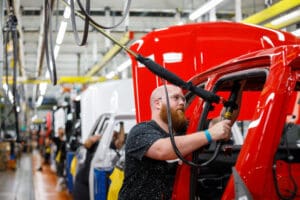
Electric vehicle (EV) sales in the UK hit a record high in September, boosted by new government subsidies that helped lure more buyers back into the market during the industry’s most crucial month of the year.
According to preliminary data from the Society of Motor Manufacturers and Traders (SMMT), sales of battery-powered cars rose by nearly a third compared with a year earlier, reaching 72,800 units.
September’s strong performance follows the government’s reintroduction of an electric car grant in July, after pressure from manufacturers struggling to meet zero emission vehicle (ZEV) mandate targets.
Plug-in hybrids and electrified vehicles lead the charge
The renewed incentive also fuelled a sharp increase in plug-in hybrid sales, which surged 56% to 38,300, as carmakers pivoted toward models combining electric and petrol power to boost profitability amid fierce global competition — particularly from new Chinese entrants.
Overall, pure electric and hybrid vehicles accounted for more than half of all UK car sales in September, helping total registrations climb 14% year-on-year to 312,900 — the strongest September since 2020.
“Our discounts have sparked a surge in electric car sales, making them cheaper and within reach of more households than ever before,” said Transport Secretary Heidi Alexander.
The revived electric car grant, offering up to £3,750 per vehicle, applies to roughly one-quarter of battery models on sale in the UK. Eligible vehicles include those from Citroën, Renault, Nissan and Vauxhall, capped at £37,000 and subject to emissions-related production criteria that exclude many Chinese-made brands.
Analysts say the subsidy has proved particularly effective for mainstream models, helping to offset higher borrowing costs and the squeeze on household budgets.
However, David Farrar, policy manager at New AutoMotive, warned that the £1.5 billion scheme — designed to support the first 400,000 buyers — could end sooner than planned.
“Early evidence suggests the grant might close earlier than intended, given the pace of take-up,” he said.
Mike Hawes, chief executive of the SMMT, said September’s figures showed that “electrified vehicles are powering market growth after a sluggish summer”, but cautioned that demand still lags behind government targets.
Under the ZEV mandate, carmakers must ensure 28% of their new car sales are fully electric in 2025, though “flexibility” clauses mean the effective target is closer to 22%, according to New AutoMotive’s analysis.
Those flexibilities, expanded in April, allow manufacturers to earn credits for cutting emissions in petrol and diesel models — a move the Climate Change Committee has warned could undermine the UK’s net zero goals.
With battery EVs currently representing 22.1% of total sales for 2025 to date, automakers are accelerating end-of-year promotions to hit compliance thresholds and avoid fines.
While September’s spike has eased pressure, industry leaders say stable policy support will be essential to maintain momentum as cost-of-living pressures and patchy charging infrastructure continue to deter potential buyers.
“Massive industry investment is paying off, despite demand still trailing ambition,” Hawes said.
The reintroduction of subsidies has clearly reignited consumer interest in electric vehicles, yet the market’s underlying affordability and infrastructure issues remain unresolved.
Analysts warn that once the grants are exhausted, sales could slow again unless the government provides a clear long-term strategy on incentives, charging networks and fleet decarbonisation.
For now, September’s surge offers a welcome reprieve — signalling that, with the right support, Britain’s shift to electric motoring may be back on track.
Read more:
UK electric car sales surge to record high as government subsidies spark demand
